-
RESEARCH01-01-2015
Analysis of the decision-making process of nurse managers: a collective refl ection
Revista Brasileira de Enfermagem. 2015;68(4):668-675
Abstract
RESEARCHAnalysis of the decision-making process of nurse managers: a collective refl ection
Revista Brasileira de Enfermagem. 2015;68(4):668-675
DOI 10.1590/0034-7167.2015680414i
Views0ABSTRACT
Objective:
to analyze the decision-making model adopted by nurses from the perspective of some decision-making process theories.
Method:
qualitative approach, based on action research. Semi-structured questionnaires and seminars were conducted from April to June 2012 in order to understand the nature of decisions and the decision-making process of nine nurses in position of managers at a public hospital in Southern Brazil. Data were subjected to content analysis.
Results:
data were classified in two categories: the current situation of decision-making, which showed a lack of systematization; the construction and collective decision-making, which emphasizes the need to develop a decision-making model.
Conclusion:
the decision-making model used by nurses is limited because it does not consider two important factors: the limits of human rationality, and the external and internal organizational environments that infl uence and determine right decisions.
Keywords:Decision Support PracticesNursingNursing Administration ResearchPractice ManagementProfessional CompetenceSee more
-
RESEARCH01-01-2015
Social representations of sexuality for the elderly
Revista Brasileira de Enfermagem. 2015;68(4):662-667
Abstract
RESEARCHSocial representations of sexuality for the elderly
Revista Brasileira de Enfermagem. 2015;68(4):662-667
DOI 10.1590/0034-7167.2015680413i
Views0See moreABSTRACT
Objective:
to know the social representations of sexuality for the elderly, based on the Social Representation Theory.
Method:
study performed in a Basic Family Health Unit in Maracanau-CE, Brazil, with 30 elderly adults. Data were collected from March through April of 2013, using the free word evocation technique. Data were organized and processed using the EVOC 2000.software
Results:
the subjects evoked 150 words associated with the evocator word “sexuality”. Out of these, 43 were different. At the possible core of the representation of sexuality for the elderly, the following words were found: love, affection and respect. Sex, companionship, understanding and coexistence composed the intermediate elements of representation.
Conclusion:
the performed analyses pointed to love, respect and affection as central elements that structured and organized the social representation of sexuality in the elder years for the group studied.
-
RESEARCH01-01-2015
Post-accident work behavior in caring for people with HIV/Aids
Revista Brasileira de Enfermagem. 2015;68(4):656-661
Abstract
RESEARCHPost-accident work behavior in caring for people with HIV/Aids
Revista Brasileira de Enfermagem. 2015;68(4):656-661
DOI 10.1590/0034-7167.2015680412i
Views0ABSTRACT
Objective:
To identify post-accident conduct in the workplace by health professionals in caring for people with HIV/Aids.
Method:
A qualitative and descriptive research study with a socio-historical perspective (1986-2006), performed in a reference hospital for infectious diseases in the State of Santa Catarina. To collect data, interviews were conducted with oral history among 23 health workers and, for the treatment of data, Bardin’s content analysis was used.
Results:
Post-accident behaviors emerged that included assessment, accident records, chemoprophylaxis when necessary, support, monitoring of the injured worker, and mainly psychological support.
Conclusion:
In situations in which the accident could not be avoided, post-exposure behaviors were important biosecurity strategies mentioned by health workers caring for patients with HIV/Aids, in the sense of minimizing the possible transmission of the HIV virus.
Keywords:Acquired Immunodeficiency SyndromeHealth ProfessionalsOccupational AccidentsOccupational HealthOccupational RisksSee more -
RESEARCH01-01-2015
Nursing care management for children hospitalized with chronic conditions
Revista Brasileira de Enfermagem. 2015;68(4):641-648
Abstract
RESEARCHNursing care management for children hospitalized with chronic conditions
Revista Brasileira de Enfermagem. 2015;68(4):641-648
DOI 10.1590/0034-7167.2015680410i
Views0See moreABSTRACT
Objective:
to understand the interactions of nurses managing nursing care for the hospitalized child with a chronic condition.
Method:
Theoretical and methodological references were used, Complex Thought and grounded theory, respectively. In the study 18 subjects have participated arranged in three groups: nurses, nursing technicians and family members. A semi-structured interview was used as technique for data collection. The data analysis followed three stages of coding: open, axial and selective.
Results:
the category “Needing to manage nursing care to the hospitalized child with chronic condition in Pediatric Inpatient Unit” and their subcategories show the complex inter subjective bindings established by nurses that support the practice of nursing care management.
Conclusion:
There are difficulties for nursing professionals to interact with the child’s family and the dialogical order/disorder/interaction/organization in the implementation of the management process of care is.
-
RESEARCH01-01-2015
Functional disability and socioeconomic and demographic factors in elderly
Revista Brasileira de Enfermagem. 2015;68(4):633-640
Abstract
RESEARCHFunctional disability and socioeconomic and demographic factors in elderly
Revista Brasileira de Enfermagem. 2015;68(4):633-640
DOI 10.1590/0034-7167.2015680409i
Views0See moreABSTRACT
Objective:
to verify the prevalence of functional disability and associated socioeconomic and demographic factors in elderly patients of Campina Grande/PB.
Method:
cross-sectional study with elderly patients of both genders. The variables associated with functional disability were assessed using Poisson regression.
Results:
A total of 420 elderly patients were included (68.1% women). The highest prevalence of functional disability were found among females aged 80 or older, white, widowed, of economic classes D/E , who lived alone, with frequency of contacts of up to 224 people and diversity of contacts of up to 14 people. After multivariate analysis, statistically significant association was observed between functional disability, gender and age group.
Conclusion:
the association between functional disability gender and age group is shown to be an important guidance for health interventions since it will allow health services to plan actions aiming to improve, maintain or restore the functional capacity of the elderly population.
-
RESEARCH01-01-2015
Hypertension and Diabetes Mellitus Program evaluation on user’s view
Revista Brasileira de Enfermagem. 2015;68(4):626-632
Abstract
RESEARCHHypertension and Diabetes Mellitus Program evaluation on user’s view
Revista Brasileira de Enfermagem. 2015;68(4):626-632
DOI 10.1590/0034-7167.2015680408i
Views0See moreABSTRACT
Objectives:
to evaluate the program proposed by the Reorganization Care Plan for Hypertension and Diabetes Mellitus on user’s view, and describe aspects of the trajectory of the participants correlating with the program’s evaluation.
Method:
evaluative study with a qualitative approach conducted in health units with the Family Health Strategy, in a city of the metropolitan region of Curitiba, in the period from September to March, 2012. A total of 30 adults with hypertension and/or Diabetes mellitus were interviewed. Data were analyzed through content analysis.
Results:
Four categories were identified: Disease diagnosis; Reasons for the program need; Knowledge of the program, and program evaluation.
Conclusion:
there was the recognition of the orientations, and the monitoring of activities developed, with emphasis in cost reduction for users.
-
RESEARCH01-01-2015
Violence in the eye of adolescents: education intervention with Culture Circles
Revista Brasileira de Enfermagem. 2015;68(4):617-625
Abstract
RESEARCHViolence in the eye of adolescents: education intervention with Culture Circles
Revista Brasileira de Enfermagem. 2015;68(4):617-625
DOI 10.1590/0034-7167.2015680407i
Views0See moreABSTRACT
Objective:
to apply the methodology of Culture Circles on adolescents as a strategy for health education of nurses in the construction of the collective knowledge of the thematic violence.
Method:
action research type and qualitative study. Participants were 11 adolescents from a public school in Recife, PE, Brazil. Data production in Culture Circles included the participant observation with field diary, photographic recording and filming, as well as the photovoice technique. The analysis was performed by triangulating data in dialogue with the literature.
Results:
it was shown that the problematizing action provided by the Culture Circle made possible to create situations in which adolescents felt invited to critically refl ect on the phenomenon of violence in all its complexity.
Conclusion:
the health education intervention, performed by Culture Circles, added learning and mutual growth subsidizing nursing care actions that excel at leadership and autonomy of adolescents.

-
ORIGINAL ARTICLE12-13-2024
Nurses’ experience regarding patient safety in mobile pre-hospital care
Revista Brasileira de Enfermagem. 2024;77(5):e20230529
Abstract
ORIGINAL ARTICLENurses’ experience regarding patient safety in mobile pre-hospital care
Revista Brasileira de Enfermagem. 2024;77(5):e20230529
DOI 10.1590/0034-7167-2023-0529
Views0See moreABSTRACT
Objectives:
to understand nurses’ experience regarding patient safety in mobile pre-hospital care.
Method:
a qualitative, exploratory and descriptive study, conducted with nurses active in mobile pre-hospital care services. Semi-structured interviews were conducted, audio-graved and submitted to Bardin’s content analysis.
Results:
from four thematic categories established, nurses reported the care and management skills necessary to work in this service. They demonstrated a commitment to ensuring safe care for patients, staff and spectators. They highlighted the actions taken to prevent and mitigate incidents. However, they based their experiences on practice protocols and individual actions, expressing the need to improve knowledge about patient safety.
Final Considerations:
mobile pre-hospital care nurses’ experience in relation to patient safety was limited, suggesting the need for training on the subject, alignment of work processes and implementation of strategies, aiming to guarantee safe care.
-
ORIGINAL ARTICLE12-13-2024
Repercussions of the pandemic on tuberculosis control actions from the perspective of health professionals
Revista Brasileira de Enfermagem. 2024;77(5):e20230477
Abstract
ORIGINAL ARTICLERepercussions of the pandemic on tuberculosis control actions from the perspective of health professionals
Revista Brasileira de Enfermagem. 2024;77(5):e20230477
DOI 10.1590/0034-7167-2023-0477
Views0See moreABSTRACT
Objectives:
to analyze the repercussions of the COVID-19 pandemic on tuberculosis control actions from the perspective of primary health care professionals.
Methods:
this descriptive study with a qualitative approach was conducted from November 2022 to April 2023, using semi-structured interviews with 11 key informant professionals from primary health care units in a Brazilian capital. Data were organized using Atlas.ti 22.0 software and subjected to thematic-categorical content analysis.
Results:
the pandemic scenario caused alterations in the work process, necessitating abrupt adaptations, and led to detrimental impacts on the health of professionals and tuberculosis control actions, which were reduced or discontinued.
Final Considerations:
there was evident unpreparedness and a lack of resources from various governmental levels and health services to handle the public health emergency situation without severe harm to the provision of essential services.
-
Training of Brazilian indigenous nurses: between human rights, valuing diversity and inclusion
Revista Brasileira de Enfermagem. 2024;77(5):e20230430
Abstract
Training of Brazilian indigenous nurses: between human rights, valuing diversity and inclusion
Revista Brasileira de Enfermagem. 2024;77(5):e20230430
DOI 10.1590/0034-7167-2023-0430
Views0See moreABSTRACT
Objectives:
to analyze the possibilities and potential of training indigenous nurses, given the Brazilian Health System (SUS), understanding the relationships between education and health.
Methods:
theoretical-reflective study, based on scientific literature, aligned with the experience, critical thinking of its authors and the Sustainable Development Goals in Brazil.
Results:
this text articulates three axes: Potential for including indigenous students in nursing training; Paths to achieving equity through inclusion and retention policies for indigenous students at different levels; and Implications of this for the SUS and global health.
Final Considerations:
indigenous students, beneficiaries of affirmative actions, face challenges of inclusion and retention in public universities that directly impact their academic training. Added to this are the difficulties identified in basic education, professor training and implementation of permanence policies, with consequences for services and training at other levels.
-
ORIGINAL ARTICLE12-13-2024
Interobserver agreement in Reception and Risk Stratification in Obstetrics implementation
Revista Brasileira de Enfermagem. 2024;77(5):e20230361
Abstract
ORIGINAL ARTICLEInterobserver agreement in Reception and Risk Stratification in Obstetrics implementation
Revista Brasileira de Enfermagem. 2024;77(5):e20230361
DOI 10.1590/0034-7167-2023-0361
Views0See moreABSTRACT
Objectives:
to analyze interobserver agreement in the Reception and Risk Stratification in Obstetrics protocol implementation.
Methods:
a cross-sectional study carried out during Reception and Risk Stratification in Obstetrics implementation, conducted in a tertiary hospital in southern Brazil with 891 participants in January 2020. Descriptive and interobserver agreement analysis was carried out using the Kappa coefficient in the risk stratification assigned by the triage nurse and reviewed by the researcher.
Results:
around half of the calls (55.6%) were stratified as not very urgent (green), followed by urgent (yellow) (31.8%), very urgent (orange) (9.3%), not urgent (blue) (3.4%) and no emerging stratification (red). Agreement analysis of revised stratification found Kappa values of 0.20 (blue), 0.54 (green), 0.77 (yellow) and 0.80 (orange).
Conclusions:
most appointments were non-urgent. The agreement analysis between the revised and assigned risk stratification revealed greater interobserver agreement as the priority level increased.
-
ORIGINAL ARTICLE12-13-2024
Adaptation and implementation of a Nursing care protocol for children in the Amazon Region
Revista Brasileira de Enfermagem. 2024;77(5):e20230245
Abstract
ORIGINAL ARTICLEAdaptation and implementation of a Nursing care protocol for children in the Amazon Region
Revista Brasileira de Enfermagem. 2024;77(5):e20230245
DOI 10.1590/0034-7167-2023-0245
Views0See moreABSTRACT
Objectives:
to describe the process of implementing an adapted protocol for pediatric nursing care in a health unit located in a municipality in the Amazon Region.
Methods:
methodological research conducted in a basic health unit with four family health teams in the state of Rondônia, involving seven nursing professionals. Data collection occurred between October 2020 and April 2022, following the research phases: situational diagnosis, exploratory phase, protocol definition, implementation, and evaluation.
Results:
the outcome was the adaptation and implementation of a nursing care protocol for children.
Final Considerations:
the adaptation and implementation process can be an effective approach to improving care, strengthening nursing as a profession with a solid foundation in scientific and clinical evidence. This facilitates early problem identification and appropriate guidance, leading to better health outcomes for children.
-
ORIGINAL ARTICLE12-13-2024
Nurses’ experiences in caring for people with mental health problems hospitalized due to clinical comorbidities
Revista Brasileira de Enfermagem. 2024;77(5):e20230136
Abstract
ORIGINAL ARTICLENurses’ experiences in caring for people with mental health problems hospitalized due to clinical comorbidities
Revista Brasileira de Enfermagem. 2024;77(5):e20230136
DOI 10.1590/0034-7167-2023-0136
Views0See moreABSTRACT
Objectives:
to understand nurses’ experiences in caring for people with mental health problems hospitalized due to clinical comorbidities in non-psychiatric Inpatient Units.
Methods:
qualitative study, guided by Alfred Schutz’s social phenomenology. Sixteen phenomenological interviews were conducted. The content was analyzed and discussed based on the literature, through the composition of three categories of analysis.
Results:
three categories emerged in the study: Challenges in care faced by nurses; Fragmented care action; and Ideal care. The disarticulation of the clinic was revealed, as described by nurses, showing care as an action far removed from the comprehensiveness of a person. Nurses’ performance is guided predominantly by biomedical reference, disregarding appreciation of subjectivity.
Final Considerations:
it was observed that nurses attribute the responsibility for patient care to factors external to their life-world, when, in fact, these aspects should be components that help them in comprehensive care construction.
-
REVIEW11-29-2024
Assessment of knowledge in oncology about care for transgender people: a scoping review
Revista Brasileira de Enfermagem. 2024;77:e20230532
Abstract
REVIEWAssessment of knowledge in oncology about care for transgender people: a scoping review
Revista Brasileira de Enfermagem. 2024;77:e20230532
DOI 10.1590/0034-7167-2023-0532
Views0ABSTRACT
Objective:
to identify evidence available in the literature on instruments and methodologies used to assess healthcare professionals’ knowledge about cancer care for the transgender population.
Methods:
a scoping review was conducted in seven databases, including studies that answered the question: what is the healthcare professionals’ level of knowledge about cancer care for the transgender population?
Results:
forty-one articles were selected that dealt specifically with healthcare professionals’knowledge in relation to care for the LGBTQIAPN+ population, especially the transgender population. Eighteen studies assessed patients’ perceptions of professionals’knowledge, whereas other studies used their own assessment tools, considering the global context of LGBTQIAPN+ health.
Conclusions:
there is no tested and validated instrument that assesses the knowledge about the transgender population’s oncological health, highlighting the need to construct and validate an instrument focused on this population’s needs.
Keywords:Health Services for Transgender PeopleNeoplasmsOncologyProfessional TrainingTransgender PeopleSee more
-
REVIEW01-01-2018
Family conference in palliative care: concept analysis
Revista Brasileira de Enfermagem. 2018;71(1):206-213
Abstract
REVIEWFamily conference in palliative care: concept analysis
Revista Brasileira de Enfermagem. 2018;71(1):206-213
DOI 10.1590/0034-7167-2016-0055
Views0See moreABSTRACT
Objective:
to analyze the attributes, antecedents and consequents of the family conference concept.
Method:
Walker and Avante’s method for concept analysis and the stages of the integrative review process, with a selection of publications in the PubMed, Cinahl and Lilacs databases focusing on the family conference theme in the context of palliative care.
Results:
the most cited antecedents were the presence of doubts and the need to define a care plan. Family reunion and working instrument were evidenced as attributes. With respect to consequents, to promote the effective communication and to establish a plan of consensual action were the most remarkable elements.
Final considerations:
the scarcity of publications on the subject was observed, as well as and the limitation of the empirical studies to the space of intensive therapy. Thus, by analyzing the attributes, antecedents and consequents of the concept it was possible to follow their evolution and to show their efficacy and effectiveness as a therapeutic intervention.
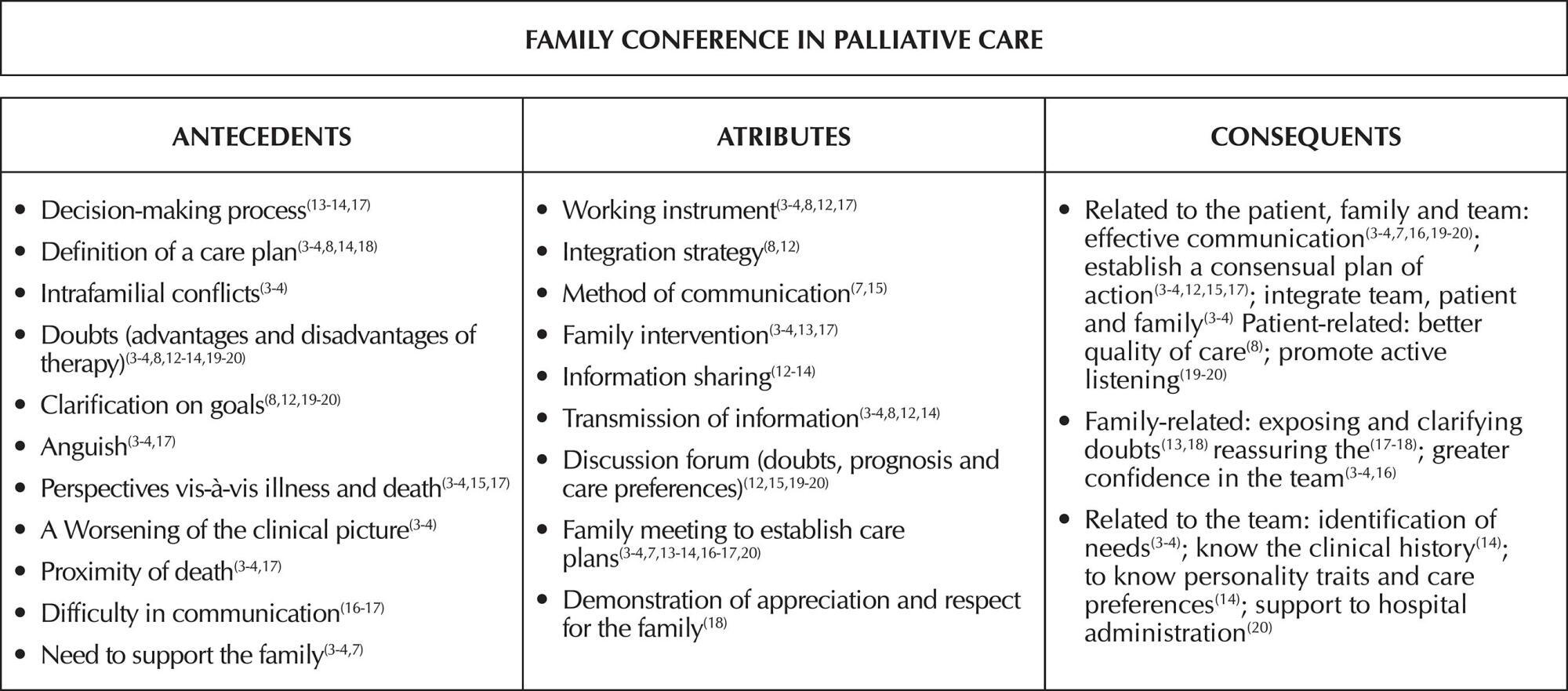
-
REVIEW01-01-2018
Quality of life in adults with sickle cell disease: an integrative review of the literature
Revista Brasileira de Enfermagem. 2018;71(1):195-205
Abstract
REVIEWQuality of life in adults with sickle cell disease: an integrative review of the literature
Revista Brasileira de Enfermagem. 2018;71(1):195-205
DOI 10.1590/0034-7167-2016-0409
Views0See moreABSTRACT
Objective:
To identify the available evidence in the literature on health-related quality of life in adults with sickle cell disease.
Method:
integrative review of MEDLINE, CUMED, LILACS and SciELO databases, from articles developed in this area, published between 2005 and 2015, in English, Portuguese or Spanish.
Results:
22 articles were included, six scales were used to evaluate health-related quality of life scores: three generic and three specific. No specific scale for adults with sickle cell disease has been adapted to Brazilian Portuguese so far. Patients affected by frequent painful crises, with low adherence to treatment, had a compromised quality of life.
Conclusion:
Selected studies have shown that patients with sickle cell disease have worse scores than the general population. These indicators should be instrumental to the nurse in the proposal of interventions and strategies of assistance and socio-educational, with a view to improving the quality of life of this clientele.
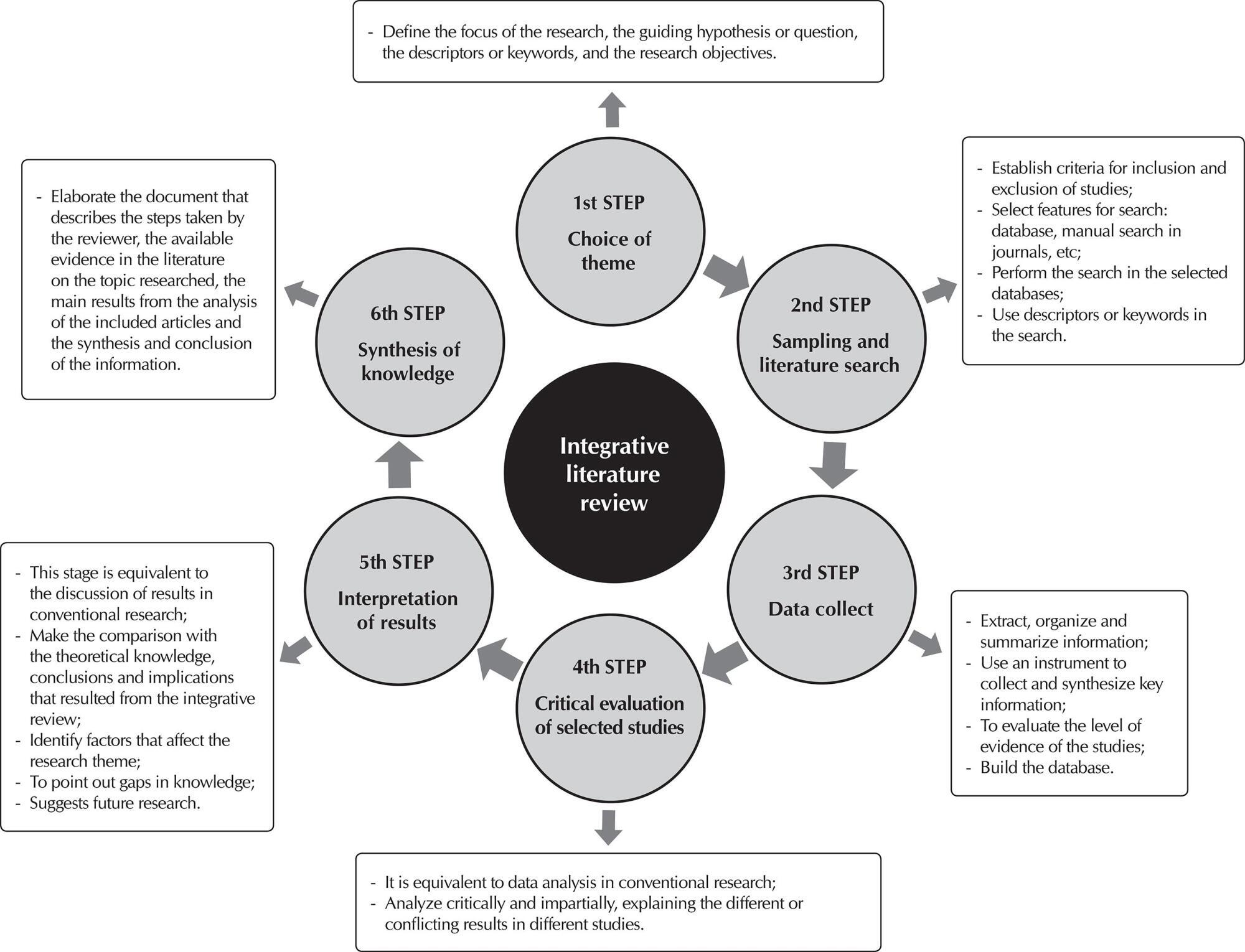
-
REVIEW01-01-2018
Care provided by the father to the child with cancer under the influence of masculinities: qualitative meta-synthesis
Revista Brasileira de Enfermagem. 2018;71(1):185-194
Abstract
REVIEWCare provided by the father to the child with cancer under the influence of masculinities: qualitative meta-synthesis
Revista Brasileira de Enfermagem. 2018;71(1):185-194
DOI 10.1590/0034-7167-2016-0671
Views0See moreABSTRACT
Objective:
To synthesize and interpret findings and conclusions of qualitative research addressing the experience of the father in the care of the child with cancer.
Method:
Meta-synthesis of 16 qualitative studies from six databases, analyzed through taxonomic analysis.
Results:
Child and adolescent cancer have several repercussions on the daily life of the father, especially related to the stigma around the disease, the fear of the unknown and the social and family role. Faced with the illness and the need to care for the child, the father seeks to recover normality in the family and transitions between hegemonic masculine behaviors and practices culturally recognized as female.
Final Considerations:
The complex experience of the father, influenced by masculinities, was evidenced. The limitations regard the restricted understanding of the contextual specificities of the experiences, due to the limited characteristics of the parents and children described in the studies. The knowledge produced is useful to promote involvement of fathers in the care of the child, as well as to strengthen and assist him in this task.
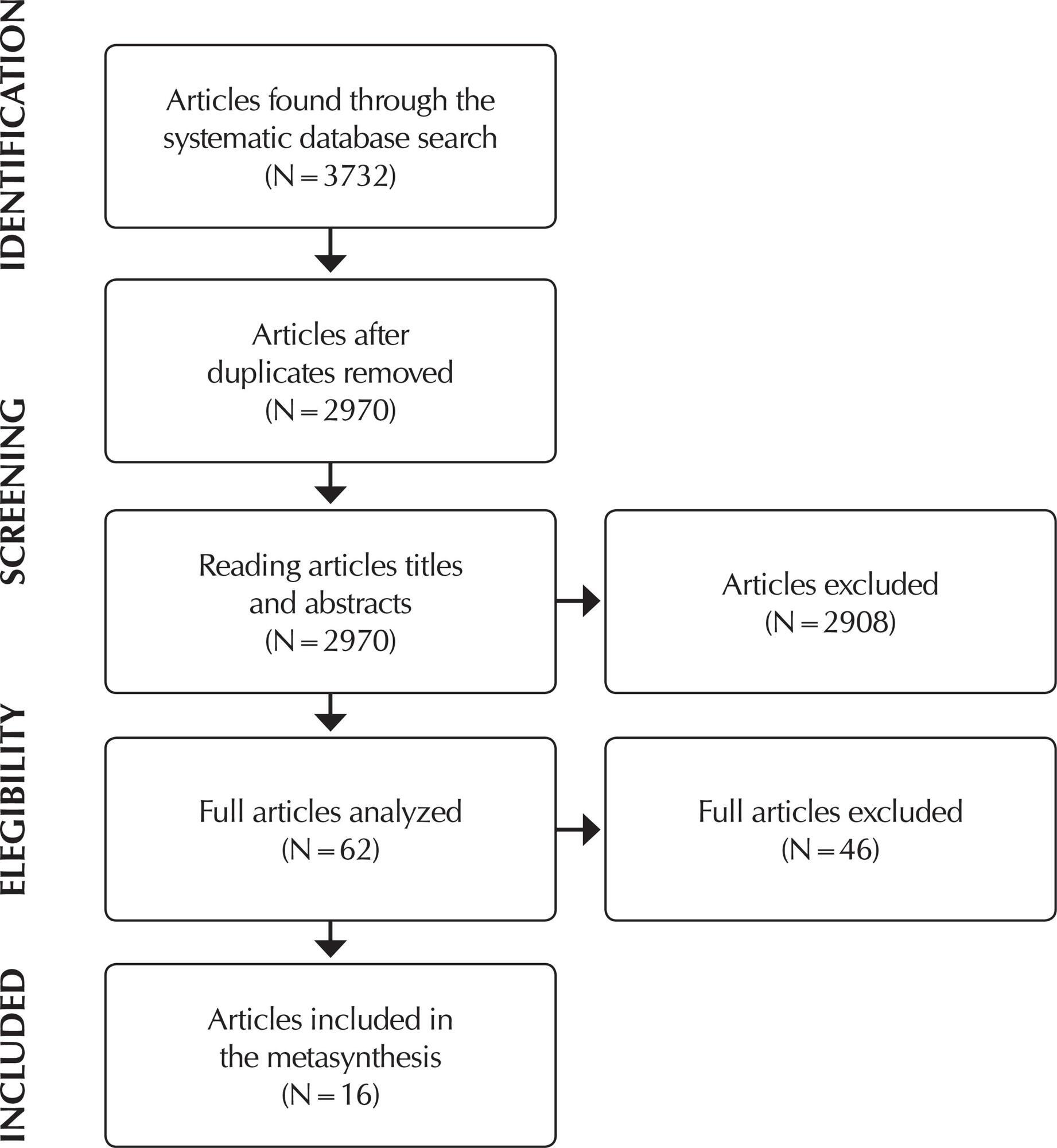
-
RESEARCH01-01-2018
Naturalization, reciprocity and marks of marital violence: male defendants’ perceptions
Revista Brasileira de Enfermagem. 2018;71(1):178-184
Abstract
RESEARCHNaturalization, reciprocity and marks of marital violence: male defendants’ perceptions
Revista Brasileira de Enfermagem. 2018;71(1):178-184
DOI 10.1590/0034-7167-2016-0475
Views0See moreABSTRACT
Objective:
to analyze male criminals’ perception about marital violence.
Method:
An exploratory, descriptive, qualitative study undertaken with 23 men who were criminally prosecuted for marital violence. A multimethod data collection was conducted, with individual interview and focal group techniques combined, between May and December 2015. The data collected were initially categorized using the NVIVO® 11 software program, and then organized using the Collective Subject Discourse method.
Results:
the collective discourses reveal that, in the male’s perception, conjugal violence is inherent in a marital relationships: it is a private, reciprocal problem that leaves body marks.
Conclusion:
gender dissymmetry as a social construct is evidenced, signaling the need to create spaces for reflection and re-signification of men and women, from a gender perspective.
-
RESEARCH01-01-2018
Impact of critical illness news on the family: hermeneutic phenomenological study
Revista Brasileira de Enfermagem. 2018;71(1):170-177
Abstract
RESEARCHImpact of critical illness news on the family: hermeneutic phenomenological study
Revista Brasileira de Enfermagem. 2018;71(1):170-177
DOI 10.1590/0034-7167-2016-0163
Views0See moreABSTRACT
Objective:
Understand the impact of critical-illness news on the experience of family members at an Intensive Care Unit.
Method:
Phenomenological approach according to Van Manen’s method. Open interviews were held with 21 family members. From analysis and interpretation of the data, three essential themes were identified: the unexpected; the pronouncement of death; and the impact on self-caring within the family. The study complied with the ethical principles inherent to research involving humans.
Results:
The unexpected news and death of the sick person influence the well-being and self-care of family members, affecting their ability for analysis and decision making. It was observed that the family experiences the news with suffering, mainly due to the anticipation arising from the events.
Final considerations:
The humanity of nurses was revealed in response to the needs of the family. In view of the requirements for information, it was verified that the information transmitted allowed them to become aware of themselves, to become empowered in their daily lives and to alleviate the emotional burden experienced.
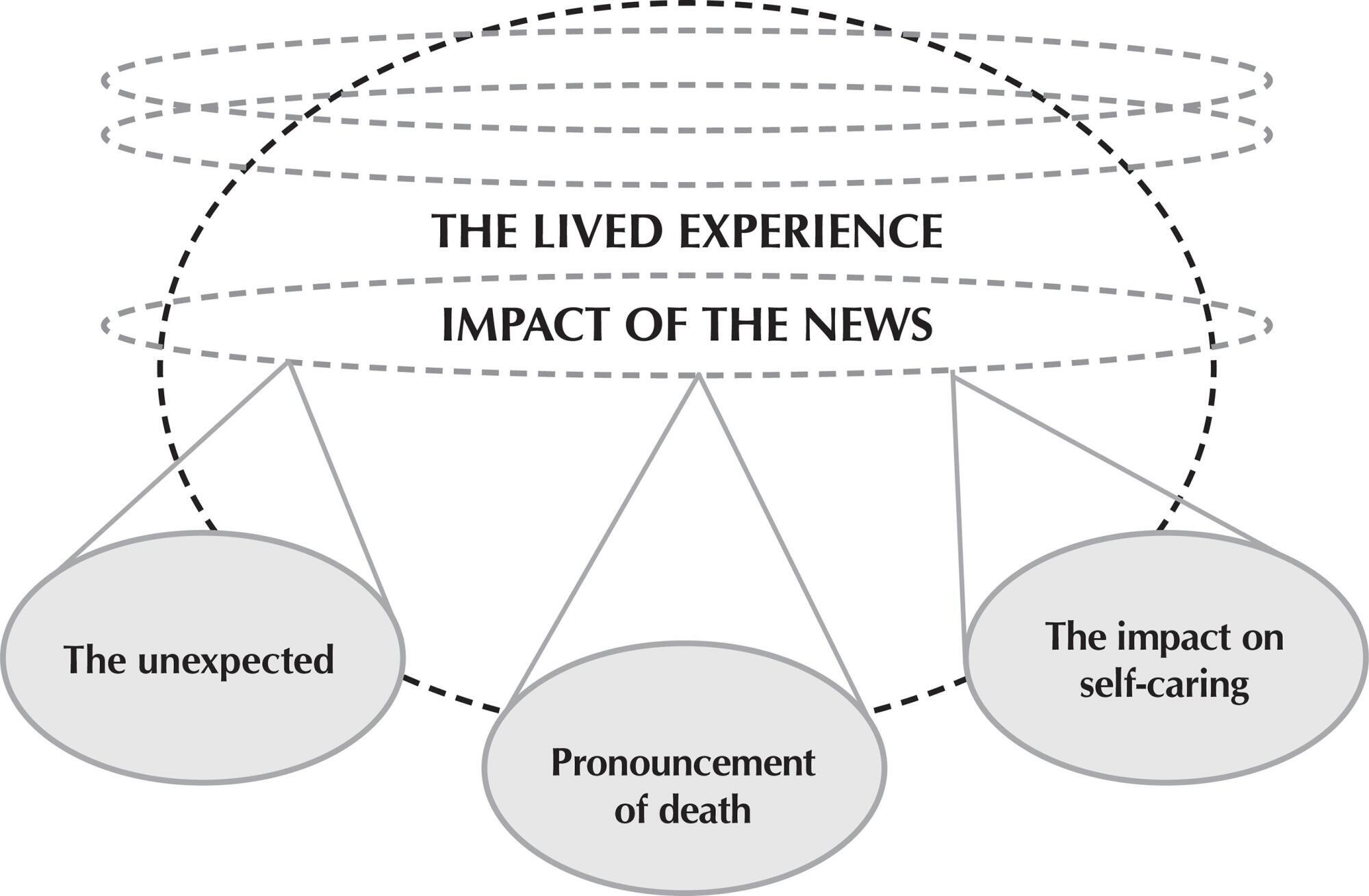
-
RESEARCH01-01-2018
Surveillance of intradomiciliary contacts of leprosy cases: perspective of the client in a hyperendemic municipality
Revista Brasileira de Enfermagem. 2018;71(1):163-169
Abstract
RESEARCHSurveillance of intradomiciliary contacts of leprosy cases: perspective of the client in a hyperendemic municipality
Revista Brasileira de Enfermagem. 2018;71(1):163-169
DOI 10.1590/0034-7167-2016-0607
Views0See moreABSTRACT
Objective:
To characterize approach methods for intradomiciliary contacts (IdC) of leprosy cases resident in Northern Brazil, during 2001-2012.
Method:
A cross-sectional and descriptive study in the state of Rondônia. Included IdC of leprosy cases diagnosed/reported in SINAN-Ministry of Health (MS), 2001-2012. A semi-structured instrument was applied to the IdCs, with six interventions: complete dermatological examination; complete neurological examination; BCG vaccination; instructions for return to the health unit; BCG guidance; and guidance to mobilize other contacts.
Conclusion:
Despite the favorable indicators of IdC examination coverage in the state, the evaluation process presents patterns that indicate operational quality failures.
-
RESEARCH01-01-2018
Enhancing the process of teaching and learning homecare
Revista Brasileira de Enfermagem. 2018;71(1):156-162
Abstract
RESEARCHEnhancing the process of teaching and learning homecare
Revista Brasileira de Enfermagem. 2018;71(1):156-162
DOI 10.1590/0034-7167-2016-0541
Views0See moreABSTRACT
Objective:
to identify possibilities for improvement in the process of teaching and learning homecare in nursing, pharmacy, medicine, nutrition, dentistry and occupational therapy courses.
Method:
qualitative research using the Grounded Theory approach. Sixty-three semi-structured interviews were conducted with students, teachers and graduates of the six mentioned courses at a public university in the south of Brazil. Data analysis was performed through open, axial and selective coding.
Results:
the possibilities for improving the process of teaching and learning homecare included: scientific production in the area; use of different teaching techniques; development of extracurricular activities; extension projects; curricular reformulation; and laboratory simulation.
Final considerations:
the strategies cited in this study enable undergraduate courses in health to envisage the possibility of enhance the process of teaching and learning homecare.
-
RESEARCH01-01-2018
Trends in the job market of nurses in the view of managers
Revista Brasileira de Enfermagem. 2018;71(1):148-155
Abstract
RESEARCHTrends in the job market of nurses in the view of managers
Revista Brasileira de Enfermagem. 2018;71(1):148-155
DOI 10.1590/0034-7167-2016-0103
Views0See moreABSTRACT
Objective:
to identify and interpret the main trends of the labor market for nurses in Rio Grande do Norte, based on the opinion of managers of training institutions and employers.
Method:
Data were collected through interviews with key informants, organized using Atlas.ti software resources and examined under the thematic content review.
Results:
the study showed six trends in the labor market of nurses: availability of professionals to the market; worsening working conditions with precariousness; indication for insertion in employment; unemployment for nurses; shortage of nurses; and the existence of a cooperative of nursing professionals.
Final considerations:
the current scenario of growth in the number of registered nurses without the expansion of the job supply has remained, unemployment tends to increase and work conditions will worsen.
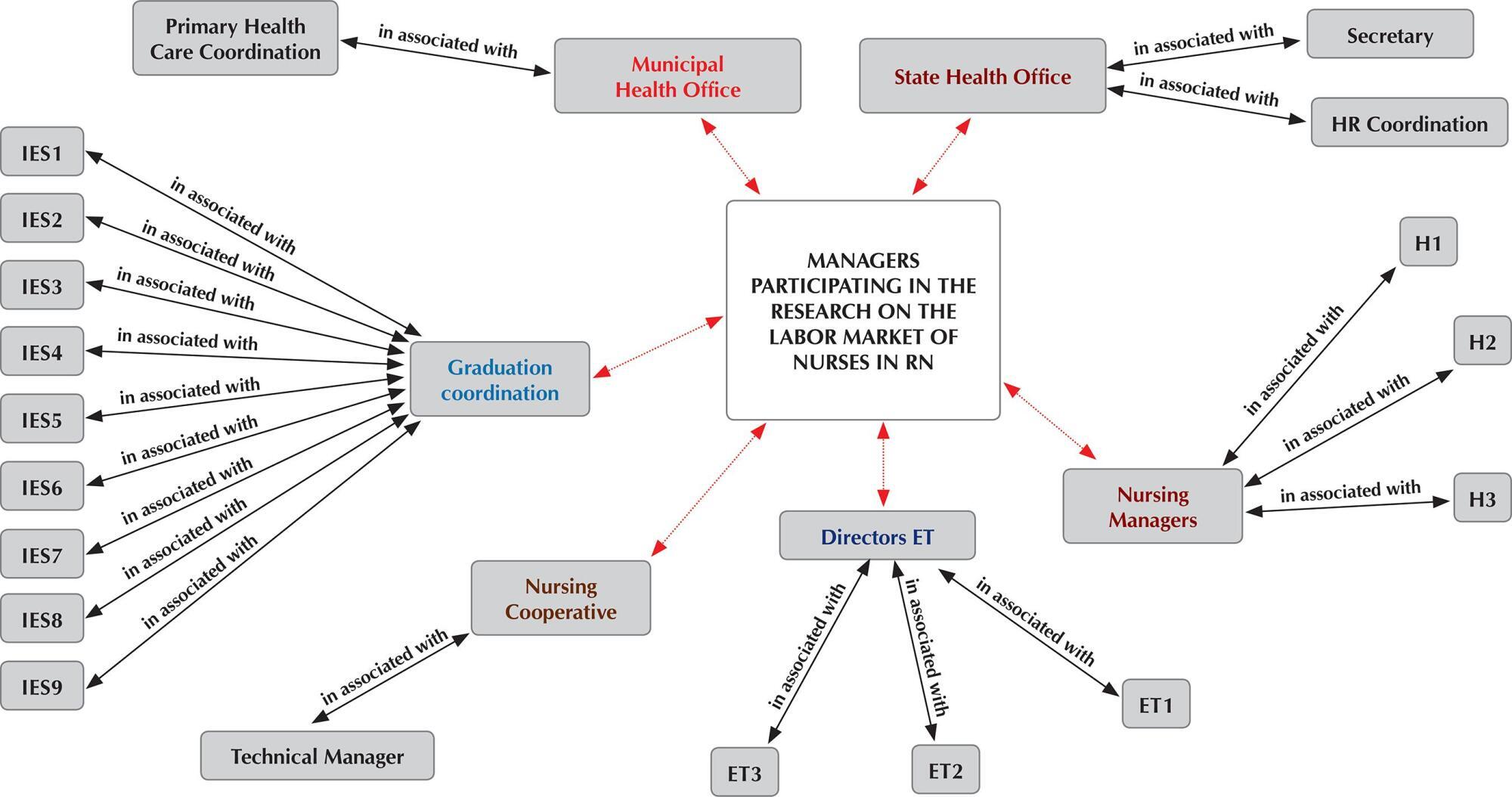
Search
Search in:
Nuvem de Tags
Aged (144) Atenção Primária à Saúde (239) COVID-19 (104) Cuidados de Enfermagem (269) Educação em Enfermagem (151) Educação em Saúde (139) Enfermagem (930) Estudos de Validação (131) Health Education (144) Idoso (208) Mental Health (149) Nursing (987) Nursing Care (306) Patient Safety (151) Primary Health Care (284) Qualidade de Vida (104) Quality of Life (106) Saúde Mental (145) Segurança do Paciente (150) Validation Studies (108)



